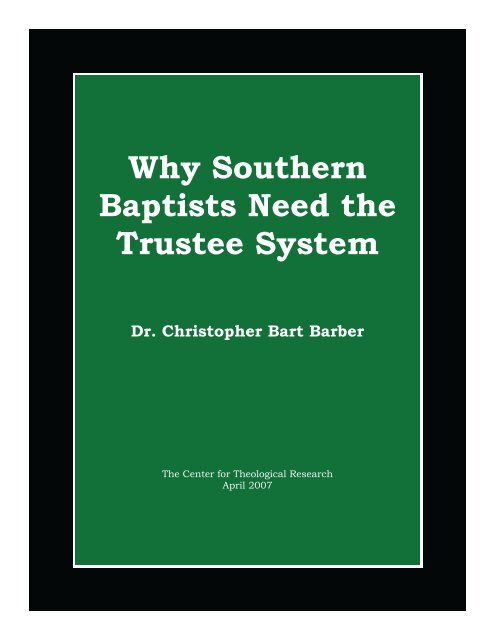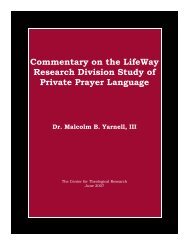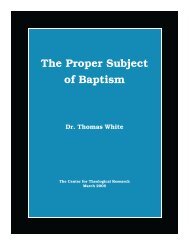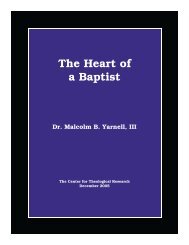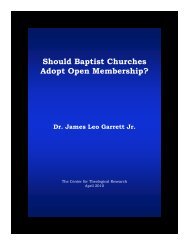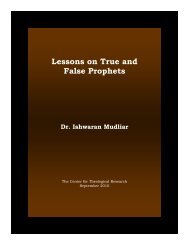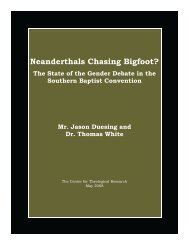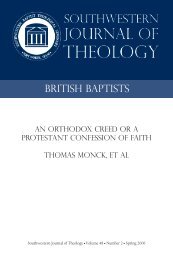Why Southern Baptists Need the Trustee System - Baptist Theology
Why Southern Baptists Need the Trustee System - Baptist Theology
Why Southern Baptists Need the Trustee System - Baptist Theology
You also want an ePaper? Increase the reach of your titles
YUMPU automatically turns print PDFs into web optimized ePapers that Google loves.
<strong>Why</strong> <strong>Sou<strong>the</strong>rn</strong><strong><strong>Baptist</strong>s</strong> <strong>Need</strong> <strong>the</strong><strong>Trustee</strong> <strong>System</strong>Dr. Christopher Bart BarberThe Center for Theological ResearchApril 2007
White Paper 16Published by <strong>the</strong> Center for Theological Researchat www.<strong>Baptist</strong><strong>Theology</strong>.org© 2007 Christopher Bart BarberPermissions: The purpose of this material is to serve <strong>the</strong> churches. Pleasefeel free to distribute as widely as possible. We ask that you maintain <strong>the</strong>integrity of <strong>the</strong> document and <strong>the</strong> author’s wording by not making anyalterations. For special requests please contact <strong>the</strong> editorial board for <strong>the</strong>White Papers for approval at ctr@swbts.edu.The Center for Theological ResearchSouthwestern <strong>Baptist</strong> Theological SeminaryFort Worth, TexasMalcolm B. Yarnell, III, Director
<strong>Why</strong> <strong>Sou<strong>the</strong>rn</strong> <strong><strong>Baptist</strong>s</strong> <strong>Need</strong> <strong>the</strong> <strong>Trustee</strong> <strong>System</strong>A White Paper from The CTR<strong>Why</strong> <strong>Sou<strong>the</strong>rn</strong> <strong><strong>Baptist</strong>s</strong> <strong>Need</strong> <strong>the</strong> <strong>Trustee</strong> <strong>System</strong>IntroductionOn 4 June 1717, six English Particular <strong>Baptist</strong> churches, determined to providegreater educational opportunities to Particular <strong>Baptist</strong> ministers, created <strong>the</strong> Particular <strong>Baptist</strong>Fund. No single congregation exclusively benefited from <strong>the</strong> work of this entity, and nosingle congregation could accomplish its objectives alone; <strong>the</strong>refore, <strong>the</strong> Particular <strong><strong>Baptist</strong>s</strong>overcame <strong>the</strong>ir characteristic misgivings about extra-congregational institutions and created<strong>the</strong> Fund. Early beneficiaries of <strong>the</strong> Fund included William Carey, fa<strong>the</strong>r of <strong>the</strong> modernmissionary movement, and John Gill, Bible commentator and <strong>the</strong>ologian.When structuring <strong>the</strong> Fund, <strong>the</strong> churches decided to establish a board of trustees tooversee <strong>the</strong> fund’s operations. In doing so, <strong>the</strong>y were not unique in Christian history. Indeed,when structuring eleemosynary organizations, Christians worshipping in a wide variety ofconfessional backgrounds, residing in numerous locales, living during different centuries,and trying to accomplish myriad charitable aims have opted to empanel boards of trustees.Its widespread popularity notwithstanding, <strong>the</strong> trustee system has faced periodiccriticism from various individual Christians and Christian groups. The <strong>Sou<strong>the</strong>rn</strong> <strong>Baptist</strong>Convention, an especially large and diverse organization structured according to <strong>the</strong> trusteesystem, has been among <strong>the</strong> more popular targets of criticisms in this vein. The principalclaims of <strong>Baptist</strong> anti-trustee criticism are largely constant regardless of epoch or situation.Many of <strong>the</strong> criticisms highlight inherent dangers or weaknesses in <strong>the</strong> trustee system, yet <strong>the</strong>strengths of <strong>the</strong> system overwhelm <strong>the</strong>se caveats. This paper will survey <strong>the</strong>se criticisms,offer a response, and demonstrate <strong>the</strong> winsome attributes of <strong>the</strong> trustee system that havemade it such a popular choice for Christians embarking upon grand ministry endeavors.The <strong>Sou<strong>the</strong>rn</strong> <strong>Baptist</strong> <strong>Trustee</strong> Board <strong>System</strong>Boards of trustees are one element of <strong>the</strong> multi-tiered structure of <strong>the</strong> <strong>Sou<strong>the</strong>rn</strong><strong>Baptist</strong> Convention. The most populous level of <strong>Sou<strong>the</strong>rn</strong> <strong>Baptist</strong> polity contains <strong>the</strong><strong>Sou<strong>the</strong>rn</strong> <strong>Baptist</strong> churches. The next level consists of <strong>the</strong> <strong>Sou<strong>the</strong>rn</strong> <strong>Baptist</strong> Convention, thatis, <strong>the</strong> annual meeting. The method of accountability from <strong>the</strong> convention to <strong>the</strong> churches iscomposition: The <strong>Sou<strong>the</strong>rn</strong> <strong>Baptist</strong> Convention is composed exclusively of messengers from<strong>the</strong> individual churches. The next level consists of <strong>the</strong> boards of trustees of <strong>the</strong> variousconvention-funded entities. The method of accountability from <strong>the</strong> trustees to <strong>the</strong> conventionis selection: Only <strong>the</strong> convention messengers in session can select agency trustees, and <strong>the</strong>convention holds <strong>the</strong> exclusive power to remove a trustee from service. Thus, every trusteeserves at <strong>the</strong> pleasure of <strong>the</strong> convention. The final level consists of <strong>the</strong> agency employees<strong>the</strong>mselves. The method of accountability from <strong>the</strong> employees to <strong>the</strong> trustees is direction:The trustees have <strong>the</strong> exclusive authority to direct <strong>the</strong> activities of <strong>the</strong> various entity<strong>Baptist</strong><strong>Theology</strong>.orgPage 1 of 9
<strong>Why</strong> <strong>Sou<strong>the</strong>rn</strong> <strong><strong>Baptist</strong>s</strong> <strong>Need</strong> <strong>the</strong> <strong>Trustee</strong> <strong>System</strong>A White Paper from The CTRemployees. Even <strong>the</strong> <strong>Baptist</strong> Faith and Message is only binding upon convention entitiesthrough <strong>the</strong> action of and subject to <strong>the</strong> direction of each entity’s trustees.Nei<strong>the</strong>r individual Christians, nor individual churches, nor <strong>the</strong> convention as a wholemay direct <strong>the</strong> convention agencies—that is <strong>the</strong> sole prerogative of <strong>the</strong> board of trustees. Theconvention messengers can communicate with boards of trustees, expressing opinions ormaking requests, but only <strong>the</strong> trustees may give binding direction to <strong>the</strong> agency employees.The trustees may not select <strong>the</strong>ir own replacements, nor may <strong>the</strong> agency heads nor <strong>the</strong> localchurches usurp <strong>the</strong> convention’s role in selection of trustees. The most powerful head of <strong>the</strong>most powerful agency of <strong>the</strong> convention cannot seat a single messenger in <strong>the</strong> annualmeeting of <strong>the</strong> convention; only a church can exercise that authority. This division ofauthority and responsibility has a long history of serving <strong>the</strong> <strong>Sou<strong>the</strong>rn</strong> <strong>Baptist</strong> people well.The Executive Committee of <strong>the</strong> <strong>Sou<strong>the</strong>rn</strong> <strong>Baptist</strong> Convention serves as a limitedinterim fiduciary entity, acting for <strong>the</strong> convention messengers between annual meetings. Like<strong>the</strong> convention messengers, <strong>the</strong> Executive Committee communicates with <strong>the</strong> various boardsof trustees. Unlike <strong>the</strong> messengers, <strong>the</strong> Executive Committee does not have <strong>the</strong> authority toalter <strong>the</strong> membership of <strong>the</strong> trustee boards. When <strong>Sou<strong>the</strong>rn</strong> <strong><strong>Baptist</strong>s</strong> created <strong>the</strong> ExecutiveCommittee in 1917, <strong>the</strong>y wished to make certain that <strong>the</strong> powerful new committee would notcircumvent <strong>the</strong> trustee system. The By-Laws of <strong>the</strong> <strong>Sou<strong>the</strong>rn</strong> <strong>Baptist</strong> Convention <strong>the</strong>reforecontain a pointed prohibition against <strong>the</strong> usurpation of trustee power by <strong>the</strong> ExecutiveCommittee:The Executive Committee shall not have authority to control or direct <strong>the</strong> severalboards, entities, and institutions of <strong>the</strong> Convention. This is <strong>the</strong> responsibility of trusteeselected by <strong>the</strong> Convention and accountable directly to <strong>the</strong> Convention. 1This entire arrangement may sound simple, but <strong>the</strong> realities of convention operationare often more complex. Agency employees are usually also members of local churches, and<strong>the</strong>y frequently serve as messengers from <strong>the</strong>ir churches. Indeed, it is likely that adisproportionate number of messengers to <strong>the</strong> annual meeting work in some way for adenominational entity. Fur<strong>the</strong>rmore, <strong>the</strong> heads of <strong>Sou<strong>the</strong>rn</strong> <strong>Baptist</strong> agencies are often farmore recognizable and trusted figures to <strong>the</strong> convention messengers than are <strong>the</strong> trustees whogovern <strong>the</strong>m. Agency heads have ample opportunity to communicate directly with <strong>the</strong>convention messengers or even with <strong>the</strong> local churches, bypassing trustee accountability oreven influencing <strong>the</strong> selection of trustees. Never<strong>the</strong>less, <strong>the</strong> ultimately insurmountableauthority of <strong>the</strong> churches guarantees that no autocrat or cabal can securely wrest control of<strong>the</strong> system from <strong>the</strong> <strong>Baptist</strong> people. The system has proven itself sound, even if to do so ithas had to withstand harsh attacks from detractors.Are <strong>Trustee</strong> Boards Scriptural?Among <strong>the</strong> most lethal arrows in <strong>the</strong> anti-trustee quiver has been <strong>the</strong> challenge toshow scriptural grounds for <strong>the</strong> structure. The force of <strong>the</strong> demand for scriptural precedent isstrongest among people like <strong><strong>Baptist</strong>s</strong> who pride <strong>the</strong>mselves upon <strong>the</strong>ir fidelity to <strong>the</strong> Bible. In1 By-Laws of <strong>the</strong> <strong>Sou<strong>the</strong>rn</strong> <strong>Baptist</strong> Convention, Article 18, Section E, Paragraph 9.<strong>Baptist</strong><strong>Theology</strong>.orgPage 2 of 9
<strong>Why</strong> <strong>Sou<strong>the</strong>rn</strong> <strong><strong>Baptist</strong>s</strong> <strong>Need</strong> <strong>the</strong> <strong>Trustee</strong> <strong>System</strong>A White Paper from The CTR1910 <strong>the</strong> infamous <strong>Sou<strong>the</strong>rn</strong> <strong>Baptist</strong> gadfly Benjamin M. Bogard 2 met I. N. Penick to debatewhe<strong>the</strong>r <strong>the</strong> <strong>Sou<strong>the</strong>rn</strong> <strong>Baptist</strong> Convention, toge<strong>the</strong>r with its boards of trustees, had <strong>the</strong> right toexist. Bogard had recently led a large group of disaffected <strong>Sou<strong>the</strong>rn</strong> <strong><strong>Baptist</strong>s</strong> out of <strong>the</strong>convention to form <strong>the</strong> early precursors of <strong>the</strong> American <strong>Baptist</strong> Association. The majorframework of Bogard’s argument consisted of seventy-six objections to <strong>the</strong> existence of <strong>the</strong>trustee-board structure of <strong>the</strong> <strong>Sou<strong>the</strong>rn</strong> <strong>Baptist</strong> Convention. His opening salvo wasted no timein attacking <strong>the</strong> Convention’s lack of explicit scriptural warrant:1. My first reason [why <strong>the</strong> <strong>Sou<strong>the</strong>rn</strong> <strong>Baptist</strong> Convention has no right to exist] isthat <strong>the</strong>re is no such organization…What agencies are [in Ephesians 3:10] represented?The church is <strong>the</strong> agent, not <strong>the</strong> convention. The Lord uses it as <strong>the</strong> agency and <strong>the</strong>individual ought to use it as <strong>the</strong> agency. The church is <strong>the</strong> thing through which God’swisdom and glory shall be made known. 3To answer Bogard’s complaint plainly, <strong>the</strong>re is no outright biblical command to setup boards of trustees, no indisputable list of qualifications for service as a trustee, and nodescription of a trustee’s duties. Of course, nei<strong>the</strong>r is <strong>the</strong>re explicit biblical warrant for <strong>the</strong>establishment of any of <strong>the</strong> entities which <strong>Sou<strong>the</strong>rn</strong> <strong><strong>Baptist</strong>s</strong> govern through trustees—anymore than <strong>the</strong>re is biblical provenance for Sunday Schools, church custodians, or children’sministers. A Christian can consistently choose <strong>the</strong> path of Primitivism, but it leads to arelatively bare cupboard of options for creativity and flexibility in ministry.Part and parcel of <strong>the</strong> choice to be <strong>Sou<strong>the</strong>rn</strong> <strong>Baptist</strong> is <strong>the</strong> belief that, in at least somecases, scriptural imperatives can provide sufficient warrant for structures and methodologiesthat <strong>the</strong> scriptures <strong>the</strong>mselves do not explicitly establish. The most prominent example is <strong>the</strong>Great Commission, in that Jesus gave <strong>the</strong> church <strong>the</strong> imperative of worldwide evangelismand discipleship. O<strong>the</strong>r portions of <strong>the</strong> New Testament specify to <strong>the</strong> churches some of <strong>the</strong>details of implementation, but not all of <strong>the</strong>m. Where <strong>the</strong> Bible does not stipulate to us <strong>the</strong>structure and methodology for our work, <strong>Sou<strong>the</strong>rn</strong> <strong><strong>Baptist</strong>s</strong> have historically believed that <strong>the</strong>responsibility falls upon us, following <strong>the</strong> leadership of <strong>the</strong> Holy Spirit, to discover andinstantiate whatever is necessary to propagate <strong>the</strong> gospel in <strong>the</strong> most powerful and efficientmanner possible.<strong>Sou<strong>the</strong>rn</strong> <strong><strong>Baptist</strong>s</strong> have adopted <strong>the</strong> board structure primarily according to <strong>the</strong>preceding line of reasoning, and not in response to any overt biblical command.Never<strong>the</strong>less, even if <strong>the</strong> office of trustee is absent from <strong>the</strong> biblical text, <strong>the</strong> concept of atrustee is not entirely extrabiblical. At <strong>the</strong> heart of trusteeship lies <strong>the</strong> root principle ofstewardship, an idea prominently spread across <strong>the</strong> pages of <strong>the</strong> Bible.Two words in <strong>the</strong> New Testament portray to us <strong>the</strong> office of <strong>the</strong> steward: epi,tropojand oikono,moj. These words appear in <strong>the</strong> New Testament in three distinct contexts. First,2 Benjamin Bogard represents <strong>the</strong> anti-trustee position in this paper for three reasons. First, his work isso comprehensive as to include every major critique of <strong>the</strong> board system. Second, Bogard’s writing isparticularly strident and eloquent. Third, this author is particularly familiar with Bogard’s work, having treatedBogard’s movement in his doctoral dissertation. See Christopher Bart Barber, “The Bogard Schism: AnArkansas <strong>Baptist</strong> Agrarian Revolt” (Ph.D. diss., Southwestern <strong>Baptist</strong> Theological Seminary, 2006).3 Benjamin Bogard, in I. N. Penick and Ben[jamin] M. Bogard, Penick-Bogard Debate: The Rights andLiberties of <strong><strong>Baptist</strong>s</strong>, transcribed by Sue White (Jackson, TN: McGowan-Merger, 1910), 29-30.<strong>Baptist</strong><strong>Theology</strong>.orgPage 3 of 9
<strong>Why</strong> <strong>Sou<strong>the</strong>rn</strong> <strong><strong>Baptist</strong>s</strong> <strong>Need</strong> <strong>the</strong> <strong>Trustee</strong> <strong>System</strong>A White Paper from The CTRJesus spoke of stewards and <strong>the</strong> concept of stewardship in His parables, commending to Hisfollowers <strong>the</strong> concept of good stewardship (e.g., Mat<strong>the</strong>w 25:14-30), and in one caseencouraging His disciples to learn a lesson from an unrighteous steward (Luke 16:1-9).Stewards were a prominent feature of life in <strong>the</strong> first-century Roman world—mosthouseholds of any wealth or privilege employed a steward. 4 The role of <strong>the</strong> steward,managing vast resources for an owner, served as a fitting illustration for several of <strong>the</strong>lessons Jesus sought to teach.Second, <strong>the</strong> Apostle Paul referred to himself as a steward by virtue of exceptionalrevelation he had received directly from Christ. In Ephesians 3:1-13, Paul indicates that “<strong>the</strong>mystery of Christ” had been entrusted to him, “<strong>the</strong> very least of all saints,” that he mightdisseminate in Christ’s service <strong>the</strong> glorious truth that “<strong>the</strong> Gentiles are fellow heirs andfellow members of <strong>the</strong> body, and fellow partakers of <strong>the</strong> promise in Christ Jesus through <strong>the</strong>gospel.” It was <strong>the</strong> discharge of this fiduciary duty, according to Paul, that had landed him inprison.Third, Paul wrote of a stewardship awarded to individual Christians as a part of <strong>the</strong>duties of office in a local church. Paul described <strong>the</strong> overseer as “God’s steward” (Titus 1:7,NASB), emphasizing <strong>the</strong> grave responsibility entrusted to <strong>the</strong> elders of <strong>the</strong> church.Describing himself, Cephas, and Apollos to <strong>the</strong> Corinthians, Paul was content to say, “Let aman regard us in this manner, as servants of Christ and stewards of <strong>the</strong> mysteries of God” (1Corinthians 4:1, NASB). Paul <strong>the</strong>n asserted a single test for judging stewardship: “In thiscase, moreover, it is required of stewards that one be found trustworthy” (1 Corinthians 4:2,NASB). 5Stewardship is simply <strong>the</strong> act of entrusting one’s goods, rights, or duties to ano<strong>the</strong>rperson’s management. It is a concept described, applauded, and enjoined in <strong>the</strong> Bible.Service on a board of trustees is nothing more and nothing less than stewardship. The Bibledoes not command <strong>the</strong> specific establishment of boards of trustees to oversee missionaryenterprises, <strong>the</strong> training of pastors, or <strong>the</strong> production of Christian literature. If churches mayrightly cooperate with one ano<strong>the</strong>r in such engagements (and <strong>Sou<strong>the</strong>rn</strong> <strong><strong>Baptist</strong>s</strong> haveconcluded that <strong>the</strong>y may), <strong>the</strong>re are few arrangements more biblical than <strong>the</strong> selection ofstewards (or trustees) to oversee and manage <strong>the</strong>ir cooperative work.Are <strong>Trustee</strong> Boards Practical?6. My sixth objection is because <strong>the</strong> Board plan is inexpedient. Expedientmeans <strong>the</strong> best means to an end. The most expedient plan is <strong>the</strong> best, and hence wewant to use expediency, and even if <strong>the</strong> convention were within <strong>the</strong> purview ofscripture like <strong>the</strong> association, I would still favor <strong>the</strong> association plan, because we cando so much more work that way.4 For example, one of <strong>the</strong> women who followed Jesus was “Joanna, <strong>the</strong> wife of Chuza, Herod’ssteward. ” (Luke 8:3a, NASB)5John Hammett has mentioned stewardship in a discussion of <strong>the</strong> role of <strong>the</strong> elder/overseer/pastor,linking it with <strong>the</strong> function of oversight. John S. Hammett, Biblical Foundations for <strong>Baptist</strong> Churches: AContemporary Ecclesiology (Grand Rapids, MI: Kregel, 2005), 164.<strong>Baptist</strong><strong>Theology</strong>.orgPage 4 of 9
<strong>Why</strong> <strong>Sou<strong>the</strong>rn</strong> <strong><strong>Baptist</strong>s</strong> <strong>Need</strong> <strong>the</strong> <strong>Trustee</strong> <strong>System</strong>A White Paper from The CTR65. My sixty-fifth objection is that <strong>the</strong> convention system has failed after a fairtrial.…[Franklin H.] Kerfoot said [at <strong>the</strong> 1901 SBC Annual Meeting in Hot Springs,Arkansas] that [<strong>the</strong> <strong>Sou<strong>the</strong>rn</strong> <strong>Baptist</strong> Convention] had failed. Now <strong>the</strong>y are wantingus to work with a failure; Kerfoot said it was a failure. 6Of Bogard’s seventy-six objections, very few attacked <strong>the</strong> efficiency of <strong>the</strong> boardsystem. Efficiency of operation is <strong>the</strong> primary virtue of <strong>the</strong> trustee approach. The <strong>Sou<strong>the</strong>rn</strong><strong>Baptist</strong> system of trustee selection strikes a balance between efficiency and accountability,deftly navigating between <strong>the</strong> extremes of direct governance and executive governance. Thepractical advantages of <strong>the</strong> trustee system are manifold, but several merit specificconsideration at this point.First, <strong>the</strong> board system enables <strong>the</strong> separate existence of <strong>the</strong> entity apart from anyo<strong>the</strong>r institution. Many of <strong>the</strong> individual churches present at <strong>the</strong> formation of our agencies areno longer in existence, yet <strong>the</strong> agencies continue in existence. Several of our agencies began<strong>the</strong>ir existence without any formal relationship with <strong>the</strong> <strong>Sou<strong>the</strong>rn</strong> <strong>Baptist</strong> Convention.<strong>Sou<strong>the</strong>rn</strong> <strong>Baptist</strong> Theological Seminary came into existence through <strong>the</strong> efforts of JamesPetigru Boyce, Basil Manly Jr., and a number of nineteenth-century <strong><strong>Baptist</strong>s</strong> who werepassionate about seminary education for <strong><strong>Baptist</strong>s</strong>. The <strong>Sou<strong>the</strong>rn</strong> <strong>Baptist</strong> Convention wasunwilling to embrace <strong>the</strong> seminary as its own until well after o<strong>the</strong>rs had founded it. Similarnarratives describe <strong>the</strong> beginnings of Southwestern <strong>Baptist</strong> Theological Seminary, most ofLifeway’s precursor entities, and <strong>the</strong> vast host of our state <strong>Baptist</strong> colleges and universities.By empanelling boards of trustees, <strong>the</strong> founders of <strong>the</strong>se institutions were able to establishstructures that could function independently of o<strong>the</strong>r institutions while remaining accountableto <strong>the</strong>ir supporters.Second, <strong>the</strong> board system frees <strong>the</strong> convention from <strong>the</strong> menial aspects of agencyoversight. The annual meetings of <strong>the</strong> <strong>Sou<strong>the</strong>rn</strong> <strong>Baptist</strong> Convention routinely register severalthousand messengers. Because of <strong>the</strong> sheer scope of <strong>the</strong> meeting, <strong>the</strong> business sessions of <strong>the</strong>convention impose strict limitations upon both <strong>the</strong> time per speaker and <strong>the</strong> overall timeavailable for <strong>the</strong> transaction of convention business. While wearing <strong>the</strong> shackles imposed bythis format, <strong>the</strong> people of <strong>the</strong> <strong>Sou<strong>the</strong>rn</strong> <strong>Baptist</strong> Convention must manage <strong>the</strong> intricacies oftwo missionary-sending agencies, six seminaries, and a collection of o<strong>the</strong>r entities. Frankly,<strong>the</strong> task is too complex for <strong>the</strong> forum. To present <strong>the</strong> necessary information for <strong>the</strong>messengers to make wise decisions, and <strong>the</strong>n to allow <strong>the</strong> necessary time for discussion of allof <strong>the</strong> issues involved, would require an exponential expansion of <strong>the</strong> time allotted forconvention business. The time is too precious to spend it deliberating upon <strong>the</strong> InternationalMission Board’s vacation policy or selecting off-campus sites for Sou<strong>the</strong>astern Seminary.Ra<strong>the</strong>r, <strong>the</strong> messengers of <strong>the</strong> convention set <strong>the</strong> broad vision of <strong>the</strong> convention and entrust<strong>the</strong> details of implementation to trustees.Third, <strong>the</strong> board system provides for oversight of sensitive matters withoutcompromising security or confidentiality. Each of our <strong>Sou<strong>the</strong>rn</strong> <strong>Baptist</strong> agencies is largeenough to face complex legal issues and personnel matters that our agencies must handlewith discretion. The International Mission Board regularly deploys personnel to areas where<strong>the</strong> injudicious release of information about individual missionaries might endanger <strong>the</strong>irmission and even <strong>the</strong>ir lives. The <strong>Sou<strong>the</strong>rn</strong> <strong>Baptist</strong> Convention achieves oversight of <strong>the</strong>se6 Benjamin Bogard, in Penick and Bogard, 31, 136-37.<strong>Baptist</strong><strong>Theology</strong>.orgPage 5 of 9
<strong>Why</strong> <strong>Sou<strong>the</strong>rn</strong> <strong><strong>Baptist</strong>s</strong> <strong>Need</strong> <strong>the</strong> <strong>Trustee</strong> <strong>System</strong>A White Paper from The CTRissues by selecting trustees who keep confidences on behalf of <strong>the</strong> institution while keepingwatch on behalf of <strong>the</strong> messengers.Fourth, <strong>the</strong> board system facilitates a more rapid response to emergent situations thancould be possible under a system of direct governance. The <strong>Sou<strong>the</strong>rn</strong> <strong>Baptist</strong> Conventionmeets once each year, but trustees are available to meet more frequently and provide interimguidance to <strong>Sou<strong>the</strong>rn</strong> <strong>Baptist</strong> agencies. When key positions of agency executive leadershipgo vacant, or when unforeseen calamity arises, <strong>the</strong> flexibility of trustee governance enhancesinstitutional efficiency.These reasons and o<strong>the</strong>rs commend <strong>the</strong> trustee board system to <strong>Sou<strong>the</strong>rn</strong> <strong><strong>Baptist</strong>s</strong>.Indeed, how could a large network of autonomous congregational churches superintend <strong>the</strong>panoply of ministries that fall within <strong>the</strong> <strong>Sou<strong>the</strong>rn</strong> <strong>Baptist</strong> Convention but for a system ofdelegated oversight similar to our trustee system? The trustee system is beyond practical; it ispractically essential.Are <strong>Trustee</strong> Boards Tyrannical?2. My second objection to <strong>the</strong> very existence of <strong>the</strong> Convention is that <strong>the</strong>Convention and Board appoint missionaries and assign <strong>the</strong> fields of labor to <strong>the</strong>m andcontrol <strong>the</strong>m in <strong>the</strong>ir work. You can read that in <strong>the</strong> minutes of <strong>the</strong> <strong>Sou<strong>the</strong>rn</strong> <strong>Baptist</strong>Convention and every convention you may find on <strong>the</strong> face of <strong>the</strong> earth. Matt. 20:25-26:“But Jesus called <strong>the</strong>m unto him and said, Ye know that <strong>the</strong> princes of <strong>the</strong> Gentilesexercise dominion over <strong>the</strong>m, and <strong>the</strong>y that are great exercise authority upon <strong>the</strong>m. Butit shall not be so among you.” No man, not even by contract, has a right to put himselfunder <strong>the</strong> control of o<strong>the</strong>r men, but missionaries are under <strong>the</strong> control of <strong>the</strong> Board, andin doing that, one man is put up above <strong>the</strong> o<strong>the</strong>r, which is a flat contradiction of <strong>the</strong>Lord’s command that it shall not be so.23. My twenty-third objection to <strong>the</strong> convention is that <strong>the</strong> system is a secretsystem, <strong>the</strong> real workings of which are kept hid from those who are expected to supportit. I have a $25.00 standing reward, and <strong>the</strong> first man that accepts it, gets it. In hismagazine, J. A. Scarboro has offered $25.00 for <strong>the</strong> names of missionaries workingunder <strong>the</strong> State Boards, where <strong>the</strong>y work and how much <strong>the</strong>y are paid, [sic] It is keptsecret from <strong>the</strong> churches and mortal man doesn’t know it today.55. My fifty-fifth objection is that <strong>Baptist</strong> preachers are held in line by fear.Hundreds are afraid to break with <strong>the</strong> Convention, for fear of ministerial ruin. Theyhave told me time and again that <strong>the</strong>y are afraid to pull out, afraid <strong>the</strong>ir bread and butterwould not come. 7Benjamin Bogard alleged that <strong>the</strong> trustee-board system of <strong>the</strong> <strong>Sou<strong>the</strong>rn</strong> <strong>Baptist</strong>Convention was abusive of <strong>Sou<strong>the</strong>rn</strong> <strong>Baptist</strong> employees (missionaries), <strong>Sou<strong>the</strong>rn</strong> <strong>Baptist</strong>churches, and <strong>Sou<strong>the</strong>rn</strong> <strong>Baptist</strong> pastors. The complaint was a strategic one for Bogard, whohad splintered <strong>the</strong> Arkansas <strong>Baptist</strong> State Convention—and eventually fragments of several7 Benjamin Bogard, in Penick and Bogard, 30, 80-81, 123.<strong>Baptist</strong><strong>Theology</strong>.orgPage 6 of 9
<strong>Why</strong> <strong>Sou<strong>the</strong>rn</strong> <strong><strong>Baptist</strong>s</strong> <strong>Need</strong> <strong>the</strong> <strong>Trustee</strong> <strong>System</strong>A White Paper from The CTRo<strong>the</strong>r state groups within <strong>the</strong> <strong>Sou<strong>the</strong>rn</strong> <strong>Baptist</strong> Convention—by alleging dictatorial excess on<strong>the</strong> part of a putative <strong>Sou<strong>the</strong>rn</strong> <strong>Baptist</strong> ruling elite class that supposedly controlled <strong>the</strong> boardsof trustees. In <strong>the</strong> history of <strong><strong>Baptist</strong>s</strong> in America, no complaint has resonated better withgrassroots <strong><strong>Baptist</strong>s</strong> than allegations of tyranny.Each time that such complaints have arisen, <strong>the</strong> <strong>Sou<strong>the</strong>rn</strong> <strong>Baptist</strong> Convention hassurvived, retaining <strong>the</strong> confidence of <strong>the</strong> majority of messengers that <strong>the</strong> board system is nottyrannical. Several arguments buttress <strong>the</strong> convention’s claim.First, boards of trustees facilitate greater involvement of <strong>Sou<strong>the</strong>rn</strong> <strong>Baptist</strong> people thanwould o<strong>the</strong>rwise be possible. The makeup of each board varies, but all of <strong>the</strong> <strong>Sou<strong>the</strong>rn</strong><strong>Baptist</strong> boards are relatively large. In fact, <strong>the</strong> trustee system distributes <strong>the</strong> agencies’ policysettingwork as widely as is practical. Members from a variety of geographical areas populate<strong>the</strong> boards, guaranteeing involvement by <strong>Sou<strong>the</strong>rn</strong> <strong><strong>Baptist</strong>s</strong> from across <strong>the</strong> convention.Apart from coming into <strong>the</strong> employ of a <strong>Sou<strong>the</strong>rn</strong> <strong>Baptist</strong> agency, no avenue provides forgreater involvement in <strong>Sou<strong>the</strong>rn</strong> <strong>Baptist</strong> ministries than service as a trustee.Second, boards of trustees are ultimately accountable to <strong>the</strong> messengers of <strong>the</strong>convention. If particularly disappointed with <strong>the</strong> actions of a particular board of trustees, <strong>the</strong>messengers to <strong>the</strong> <strong>Sou<strong>the</strong>rn</strong> <strong>Baptist</strong> Convention always have <strong>the</strong> prerogative to unseat <strong>the</strong>entire board and replace it with new trustees of <strong>the</strong> messengers’ choosing. <strong>Sou<strong>the</strong>rn</strong> <strong>Baptist</strong>history demonstrates plainly that <strong>the</strong> voice of <strong>the</strong> people can prevail over any entity through<strong>the</strong> trustees—a principle evident as early as <strong>the</strong> Whitsett controversy (1899) and as recentlyas <strong>the</strong> Conservative Resurgence (1979 and following).Third, <strong>the</strong> <strong>Sou<strong>the</strong>rn</strong> <strong>Baptist</strong> agencies are dependent upon <strong>the</strong> churches for <strong>the</strong>ircontinued funding. Although <strong>the</strong> agencies depend upon <strong>the</strong> Cooperative Program to varyingdegrees, none of <strong>the</strong>m could survive without <strong>the</strong> robust pecuniary support of <strong>Sou<strong>the</strong>rn</strong> <strong>Baptist</strong>churches. Since <strong>the</strong> legal relationship between <strong>the</strong> <strong>Sou<strong>the</strong>rn</strong> <strong>Baptist</strong> Convention and <strong>the</strong>agencies prevents <strong>the</strong>m from severing <strong>the</strong>ir ties with <strong>the</strong> convention and negotiating afunding relationship with ano<strong>the</strong>r institution, and since no agency is able to control its ownstream of funding from <strong>Sou<strong>the</strong>rn</strong> <strong>Baptist</strong> churches, true tyranny from <strong>Sou<strong>the</strong>rn</strong> <strong>Baptist</strong>trustees is quite unlikely.In <strong>the</strong> last decade of <strong>the</strong> twentieth century and <strong>the</strong> first decade of <strong>the</strong> twenty-first, adisturbing trend has developed among <strong>the</strong> agencies of <strong>the</strong> various state conventions.Reaching a crisis point with Baylor University’s self-appointments in 1991, many of <strong>the</strong>seagencies, especially <strong>the</strong> colleges and universities, have begun to revoke unilaterally <strong>the</strong> rightof messengers of <strong>the</strong> various state conventions to control <strong>the</strong> makeup of <strong>the</strong> boards of trusteesthat oversee <strong>the</strong> agencies. This trend represents nothing less than <strong>the</strong> mutation of <strong>the</strong> entitiesinvolved from <strong>Baptist</strong> organizations to something o<strong>the</strong>r. 8Such contravention of <strong>Baptist</strong> polity can only occur when multiple tiers of our polityfail simultaneously. The trustee tier has failed when trustees abandon conscience andwantonly grab power that rightfully belongs to <strong>the</strong> convention messengers who entrusted<strong>the</strong>m with <strong>the</strong>ir positions. The messenger tier has failed when conventions succumb after <strong>the</strong>fact to <strong>the</strong> privateering actions of renegade trustees. The congregational tier has failed whencongregations allow to go unchallenged decisions by <strong>the</strong> convention that so blatantly elevate8 See Malcolm B. Yarnell, “Self-perpetuating trustee boards violate historic <strong>Baptist</strong> principles,” ThePathway (28 October 2002, Convention Special Edition): 5-7. Yarnell’s article carefully documents <strong>the</strong>variance between this recent practice and historic <strong>Baptist</strong> polity.<strong>Baptist</strong><strong>Theology</strong>.orgPage 7 of 9
<strong>Why</strong> <strong>Sou<strong>the</strong>rn</strong> <strong><strong>Baptist</strong>s</strong> <strong>Need</strong> <strong>the</strong> <strong>Trustee</strong> <strong>System</strong>A White Paper from The CTR<strong>the</strong> interests of <strong>the</strong> institutions above <strong>the</strong> interests of <strong>the</strong> local churches. Indeed, it is only ashort journey from self-perpetuating boards of trustees to despotic wresting of conventionpower from <strong>the</strong> messengers and <strong>the</strong> churches altoge<strong>the</strong>r. 9Where accountability to <strong>the</strong> churches has vanished, tyranny is indeed likely toflourish and institutional actions are likely to dishonor Christ. Thankfully, such is not <strong>the</strong>case with <strong>the</strong> <strong>Sou<strong>the</strong>rn</strong> <strong>Baptist</strong> Convention and its entities, for <strong>the</strong>y remain responsible to <strong>the</strong>churches.The trustee system as practiced by <strong>Sou<strong>the</strong>rn</strong> <strong><strong>Baptist</strong>s</strong> is not tyrannical; however,nei<strong>the</strong>r is it whimsical. The system is deliberately deliberate. An instantaneously responsivetrustee system would inject unhealthy chaos into <strong>the</strong> mechanisms of <strong>Sou<strong>the</strong>rn</strong> <strong>Baptist</strong>ministry. The lag of trustee response provides safeguards for <strong>Sou<strong>the</strong>rn</strong> <strong>Baptist</strong> polity.First, <strong>the</strong> system safeguards <strong>the</strong> institutions from hasty decisions. The <strong>Sou<strong>the</strong>rn</strong><strong>Baptist</strong> Convention, through its entities, deals with many issues that are both technicallyarcane and emotionally volatile. The democratic polity of <strong>the</strong> SBC enables any messenger tobring to <strong>the</strong> floor of <strong>the</strong> annual meeting <strong>the</strong> details of his knee-replacement surgery in orderto dispute Guidestone’s insurance coverage decisions. Any disgruntled agency employee canget messenger credentials from a local church and take petty gripes to <strong>the</strong> floor of <strong>the</strong>convention to seek public satisfaction. The ability for any individual <strong>Baptist</strong> to bringconcerns directly to <strong>the</strong> messengers is one of <strong>the</strong> most precious treasures of <strong>Baptist</strong> polity.<strong>Baptist</strong> compassion will motivate <strong>the</strong> messengers to consider <strong>the</strong> needs of individuals; <strong>Baptist</strong>wisdom will motivate <strong>the</strong> messengers to exercise caution in building agency policy aroundisolated cases. The trustee system imposes a damper upon such decision-making, entrustingrelevant messenger initiatives to trustee deliberation before <strong>the</strong> convention can make anydetermination.Second, <strong>the</strong> trustee system eventuates an informal accountability of each annualmeeting of <strong>the</strong> convention to <strong>the</strong> annual meetings that transpire before and after it. No quirkyconfluence of messengers can easily supplant <strong>the</strong> mission, doctrine, personnel, and policy of<strong>the</strong> <strong>Sou<strong>the</strong>rn</strong> <strong>Baptist</strong> Convention in a single year. The people of <strong>the</strong> <strong>Sou<strong>the</strong>rn</strong> <strong>Baptist</strong>Convention hold <strong>the</strong> authority to direct each agency along any course of action that <strong>the</strong>ydesire, but <strong>the</strong> course of action must be important enough and wise enough to hold <strong>the</strong> favorof <strong>the</strong> <strong>Sou<strong>the</strong>rn</strong> <strong>Baptist</strong> people for several years before radical change can take place. Thus,<strong>the</strong> trustee system is both difficult to abuse from within by <strong>the</strong> development of entrenchedpower and difficult to abuse from without by <strong>the</strong> disingenuous fomentation of rebellion.ConclusionThe objections of critics are not altoge<strong>the</strong>r without merit. <strong>Sou<strong>the</strong>rn</strong> <strong><strong>Baptist</strong>s</strong> haveendured seasons of wasteful bureaucracy, criminal malfeasance, executive ineptitude, and<strong>the</strong>ological heterodoxy in our 162 years of existence. Each episode has amounted to a failureof <strong>the</strong> <strong>Sou<strong>the</strong>rn</strong> <strong>Baptist</strong> structure of trustee oversight. However, more often than not, trustee9 Just fifteen years after <strong>the</strong> 1991 Baylor charter change, <strong>Baptist</strong> General Convention of TexasPresident Michael Bell successfully ruled out-of-order a motion from <strong>the</strong> floor at <strong>the</strong> 2006 annual meeting byarguing that <strong>the</strong> BGCT Executive Board held sole authority over <strong>the</strong> matter in question. Bell claimed thatExecutive Board action had “preempted action by <strong>the</strong> convention”—an unprecedented and unthinkable ruling in<strong>Baptist</strong> denominational life. See Gregory Tomlin, “Motion on Criminal Probe Ruled Out of Order at BGCT,”<strong>Baptist</strong> Press (14 November 2006).<strong>Baptist</strong><strong>Theology</strong>.orgPage 8 of 9
<strong>Why</strong> <strong>Sou<strong>the</strong>rn</strong> <strong><strong>Baptist</strong>s</strong> <strong>Need</strong> <strong>the</strong> <strong>Trustee</strong> <strong>System</strong>A White Paper from The CTRoversight also provided <strong>the</strong> solution to <strong>the</strong>se problems and, through wise stewardship inpersonnel and policies, solved many problems before <strong>the</strong>y ever arose. And when <strong>the</strong> trusteeswere unable or unwilling to solve <strong>the</strong> problems, <strong>the</strong> churches have exercised <strong>the</strong>ir prerogativeto appoint trustees through <strong>the</strong> democratic process to address <strong>the</strong>m appropriately.Any system populated by sinful people is prone to failure. However, abuse of <strong>the</strong>trustee system is no more prominent than <strong>the</strong> abuse of congregationalism that may take placewhen scandal rocks local churches, and no true <strong>Baptist</strong> would argue for <strong>the</strong> dismissal of <strong>the</strong>biblical system of congregationalism simply because it may have been abused. (Again, moreoften than not, <strong>the</strong> system of congregational governance has adequately—even superbly—solved <strong>the</strong> problems that have arisen.) Moreover, abuse of <strong>the</strong> trustee system is certainly nomore prominent than what occurs in those systems of governance where autocrats manage todivorce <strong>the</strong>mselves from accountability to God’s people. Even philosophers have recognizedthat some form of democratic polity, though it is problematic, is less problematic than <strong>the</strong>alternatives of aristocracy and tyranny. 10 Although abuse is possible under <strong>the</strong> democratictrustee system, <strong>the</strong> potential for abuse is as bad or worse under any o<strong>the</strong>r system imaginable.The greatest commendation for <strong>the</strong> trustee-board system is <strong>the</strong> fact that it hasfacilitated so much good work for <strong>the</strong> kingdom of God on such a large scale for so long withso little trouble (comparatively). I. N. Penick drew his defense of <strong>the</strong> <strong>Sou<strong>the</strong>rn</strong> <strong>Baptist</strong>Convention’s structure to a close by reciting <strong>the</strong> long litany of missionary boards, educationalinstitutions, and charitable enterprises that had flourished and had harnessed <strong>the</strong> labors offaithful <strong>Sou<strong>the</strong>rn</strong> <strong><strong>Baptist</strong>s</strong> through 1910. Nearly a century later, we can affirm that <strong>the</strong> systemstill works today as well as it did <strong>the</strong>n. Penick concluded, “I am standing with <strong>the</strong> <strong><strong>Baptist</strong>s</strong>who are doing <strong>the</strong> work.” 11 The trustee system works well for <strong>Sou<strong>the</strong>rn</strong> <strong><strong>Baptist</strong>s</strong>, and<strong>Sou<strong>the</strong>rn</strong> <strong><strong>Baptist</strong>s</strong> work well through it.10 Literally, democracy is “<strong>the</strong> most moderate of <strong>the</strong> deviations” of ideal constitutional forms. Aristotle,The Politics, transl. T.A. Sinclair (New York: Penguin, 1992), 239.11 I. N. Penick, in Penick and Bogard, 152.<strong>Baptist</strong><strong>Theology</strong>.orgPage 9 of 9
Dr. C. Bart BarberPastor, First <strong>Baptist</strong> Church,Farmersville, TX


